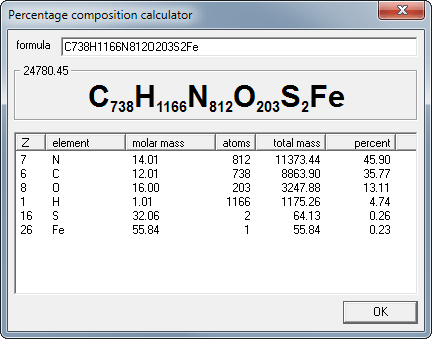What is percentage composition?
The percent composition (percentage composition) of a compound is a relative measure of the mass of each different element present in the compound.
To calculate the percent composition (percentage composition) of a compound
Calculate the molecular mass (molecular weight, formula mass, formula weight), MM, of the compound
Calculate the total mass of each element present in the formula of the compound
Calculate the percent compositon (percentage composition): % by weight (mass) of element
= (total mass of element present ÷ molecular mass) x 100
Example 1.
What percentage of the mass of carbon dioxide (CO2) is made up by the carbon?
Solution:
first find the mass of the total compound.
C = 12.0 u x 1 atom = 12.0 u
O = 16.0 u x 2 atoms = 32.0 u
--------
44.0 u
next use the formula:
partial mass from carbon
% of the mass of CO2 that is made up by carbon = -------------------------- x 100
total mass of the CO2
12.0 u
% of the mass of CO2 that is made up by carbon = ------------------------- x 100
44.0 u
% of the mass of CO2 that is made up by carbon = 27.3%
Answer = 27.3%
Now, it is more typical to be asked what the percentage composition of the entire compound is. In the example above, you can assume that if carbon makes up approximately 27% of the mass of carbon dioxide then oxygen makes up about 73%, for the total must be 100%.
Example 2.
What is the percentage composition of glucose (C6H12O6) ?
solution:
find the mass of the entire molecule,
C = 12.0 u x 6 atoms = 72.0 u
H = 1.01 u x 12 atoms = 12.1 u
O = 16.0 u x 6 atoms = 96.0 u
----------
180 u
Then use the formula for each element in the compound:
partial mass from element
% of the mass of the compound that is made up by an element = -------------------------- x 100
total mass of the compound
72.0 u
% for Carbon = ---------------- x 100 = 40.0%
180 u
12.1 u
% for Hydrogen = ---------------- x 100 = 6.7 %
180 u
96.0 u
% for Oxygen = --------------- x 100 = 53.3%
180 u
One way to check your answer is to make sure that all of the percentages add up to approximately 100%. (i.e. 40.0% + 6.7% + 53.3% = 100%) Your total may be off by a few tenths of a percent, due to rounding.
Example 3.
Calculate the percent by weight of each element present in ammonium phosphate [(NH4)3PO4]
Calculate the molecular mass (MM) of (NH4)3PO4:
MM = 3x[14.01 + (4 x 1.008)] + 30.97 + (4 x 16.00) = 3 x [14.01 + 4.032] + 30.97 + 64.00 = (3 x 18.042) + 30.97 + 64.00 = 54.126 + 30.97 + 64.00 = 149.096
Calculate the total mass of N present:
3 N are present, mass = 3 x 14.01 = 42.03
Calculate the percent by mass of N present in (NH4)3PO4:
%N = (mass N ÷ MM) x 100 = (42.03 ÷ 149.096) x 100 = 28.19%
Calculate the total mass of H present:
12 H are present in the formula, mass = 12 x 1.008 = 12.096
Calculate the percent by mass of H present in (NH4)3PO4:
%H = (mass H ÷ MM) x 100 = (12.096 ÷ 149.096) x 100 = 8.11%
Calculate the total mass of P present:
1 P is present in the formula, mass = 30.97
Calculate the percent by mass P in (NH4)3PO4:
%P = (mass P ÷ MM) x 100 = (30.97 ÷ 149.096) x 100 = 20.77%
Calculate the total mass of O present:
4 O are present in the formula, mass = 4 x 16.00 = 64.00
Calculate the percent by mass of O in (NH4)3PO4:
%O = (mass O ÷ MM) x 100 = (64.00 ÷ 149.096) x 100 = 42.93%
The answers above are probably correct if %N + %H + %P + %O =100, that is,
28.19 + 8.11 + 20.77 + 42.93 = 100 %
Here is a video on YouTuBe:

